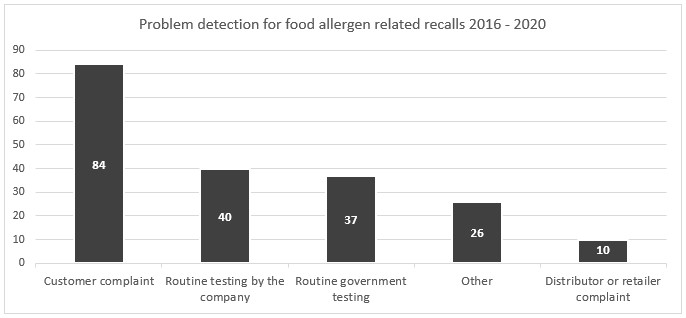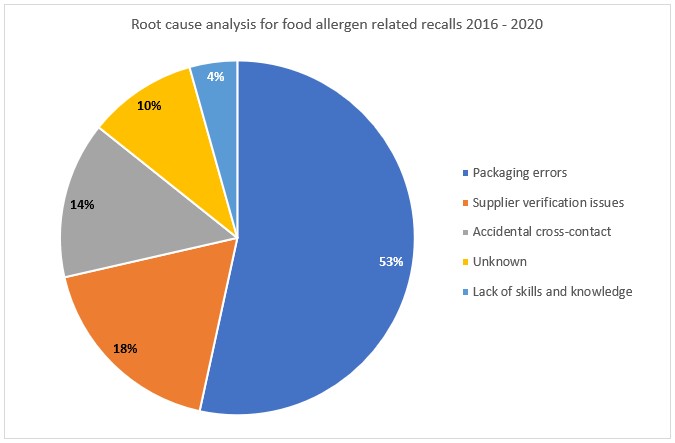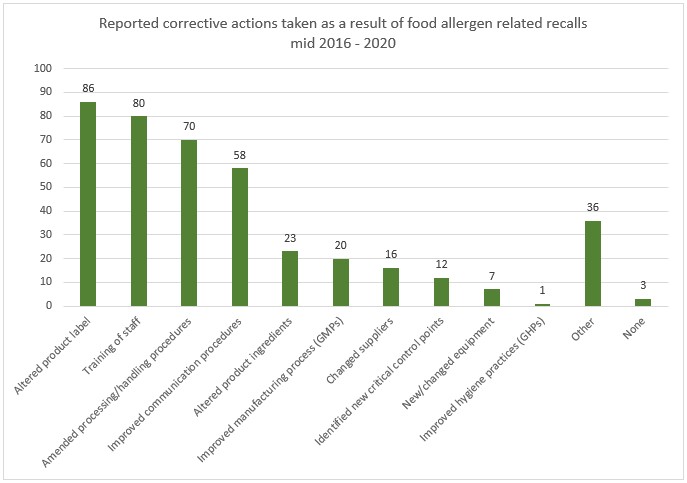Each year, hundreds of food recalls occur in Australia to remove potentially unsafe food from the supply chain and protect consumers. The reasons for these food recalls are varied and include microbial contamination (e.g. the presence of harmful bacteria, viruses or parasites), labelling issues (e.g. incorrect labelling of ingredients) and foreign matter being present (e.g. materials such as glass, metal or plastic), to name just a few.
Food Standards Australia New Zealand (FSANZ) is the national body that coordinates food recalls in Australia. Earlier this year, they updated their food recall statistics for the last nine years, which uncovered some interesting trends. The most noteworthy being the growing number of food recalls related to undeclared allergens.
In 2020, 51 food recalls were conducted due to the presence of one or more undeclared allergens, an increase of 59% from 2019. Undeclared allergens accounted for 47% of all food recalls last year, making it the leading reason for food being recalled.
Recalls in 2020 due to undeclared allergens
| Product origin |
# of recalls |
% of recalls |
| Australian |
24 |
47% |
| Imported |
26 |
51% |
| Unspecified |
1 |
2% |
| Total |
51 |
What are food allergens?
Food allergens are proteins in foods or derivatives of them that cause abnormal immune responses. The prevalence of food allergies around the world is believed to be increasing, with more than 8% of children and 2% of adults in Australia and New Zealand having an allergy to one or more foods. The most likely food allergens to cause illness are milk, peanuts, tree nuts, egg, wheat (gluten), sesame seeds, fish, crustacea, soy and lupins.
Why do undeclared food allergens matter?
While undeclared allergens don’t affect everyone, they can be harmful to people with a food allergy. Allergic reactions can range in severity, from gastrointestinal discomfort to itchy skin; hives and welts; swelling of the eyes, lips or throat; and, in most severe cases, loss of consciousness or death. Consumers living with food allergies rely on accurate food labelling to make informed decisions about what to eat and what to avoid.
Top 3 undeclared allergens
The following table outlines the top 3 undeclared allergens that led to food recalls in 2020, and how this compares to the 10-year average.
|
2020 Food Recalls |
2011 – 2020 Food Recalls |
|
47% of all food recalls due to undeclared allergens |
Average of 42% of all food recalls due to undeclared allergens |
|
Top 3 undeclared allergens: Peanuts 29% Milk 20% Multiple (two or more allergens) 20% |
Top 3 undeclared allergens: Milk 29% Peanuts 17% Multiple (two or more allergens) 17% |
Changes to post recall reporting by food businesses
In 2016, FSANZ began collecting additional information about food recalls as part of the post recall reporting process. This included:
- how the problem was detected
- the root cause of the problem, as identified by the food business
- corrective actions taken.
How problems were detected
The graph below shows that the majority of undeclared food allergens were detected by consumers themselves who made a complaint. That is more than double the number of problems detected by food businesses via routine testing.

Root cause information
FSANZ has identified four root causes for undeclared allergens in food. These include:
- Packaging errors – wrong packaging was used with incorrect ingredient lists.
- Supplier verification issues – raw ingredient/s contained an allergen, but the manufacturer was not informed.
- Accidental cross contamination – raw ingredients contaminating other ingredients prior to production, or during the production process.
- Lack of skills & knowledge to fulfil labelling requirements – incorrect allergens declared, product ingredients changed but the label did not, or ingredients were not fully-translated into English from their original language.
In some cases, the reason for the problem was not provided, or unable to be identified, by the food business.

As you can see from the graph above, over half of the recalls that occurred due to undeclared allergens were because of packaging errors (53%) or supplier verification issues (18%).
Corrective actions taken
The food businesses implicated advised FSANZ of a range of corrective actions they had taken to rectify the problems. These included:
- Altering product ingredients
- Altering product labels
- Amending processing / handling procedures
- Changing suppliers
- Identifying new critical control points in their production system to be managed
- Improving communication procedures
- Improving good hygiene practices (GHPs)
- Improving good manufacturing practices (GMPs)
- New/changing equipment
- Training of staff.

Key learnings for other food businesses
No food business wants to produce unsafe food and undergo a food recall. In addition to being a risk to public health, food recalls can be costly and cause damage your brand’s reputation. It is therefore in the best interest of food businesses to be informed about food allergens and proactive in managing this risk.
Here are some of the ways you can do this:
- Request certificates of analysis from your suppliers for raw ingredients that confirm that no allergens are present.
- Test raw ingredients for allergens to verify these claims before use.
- Separate raw ingredients that contain allergens from others and clearly label them.
- Schedule your production line so that products containing allergens are produced at the end. This will minimise the risk of cross-contamination during production.
- Double check you’re using the correct labels before production begins, and ensure a manager signs off on them first.
- Conduct a thorough clean down of equipment after products containing allergens have been used (this includes environmental swabbing).
- Provide regular staff training about allergens (including annual refresher training).
Helpful resources
FSANZ – The FSANZ website offers a range of allergen resources, including labelling requirements for food processors and the food services sector. Food Standards Code – Standard 1.2.3 and 1.2.4 and 1.2.8 are particularly helpful.
Queensland Health – Provides information on food labelling requirements, including allergens. Their Food Pantry also offers a range of food safety training resources, including a course ‘All About Allergens’
Allergen Bureau – provides industry best practise information, resources, practical tools, and industry contacts for the better management of food allergens. They also provide free training for food businesses on Food Allergen Fundamentals.
Australian Food and Grocery Council – Provides guidance for the food industry (the Food Industry Guide to Allergen Management and Labelling) about allergen management and labelling including precautionary statements.
Dairy Food Safety Victoria – Provides a guide to managing allergens in the dairy industry.
The Food Recall Process in Australia – a free online training course for dairy manufacturers on how to handle a food recall in their business. Developed by Safe Food Production Queensland on behalf of Dairy Australia.
Allergy & Anaphylaxis Australia – Has information and resources for consumers and food businesses including an allergen checklist.
Australian Department of Agriculture, Water and Environment – Information for exporters on importing country requirements.
Food Allergy Training – Provides free food allergy training courses for the food services industry.
